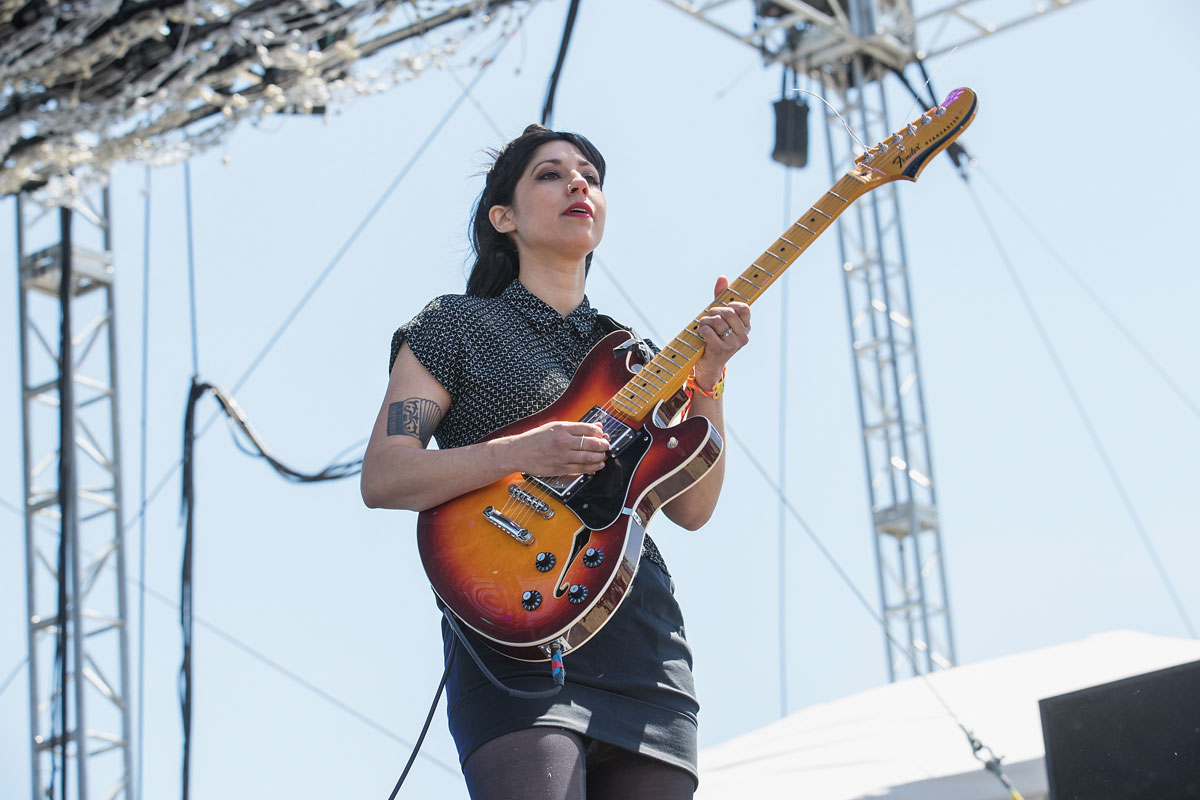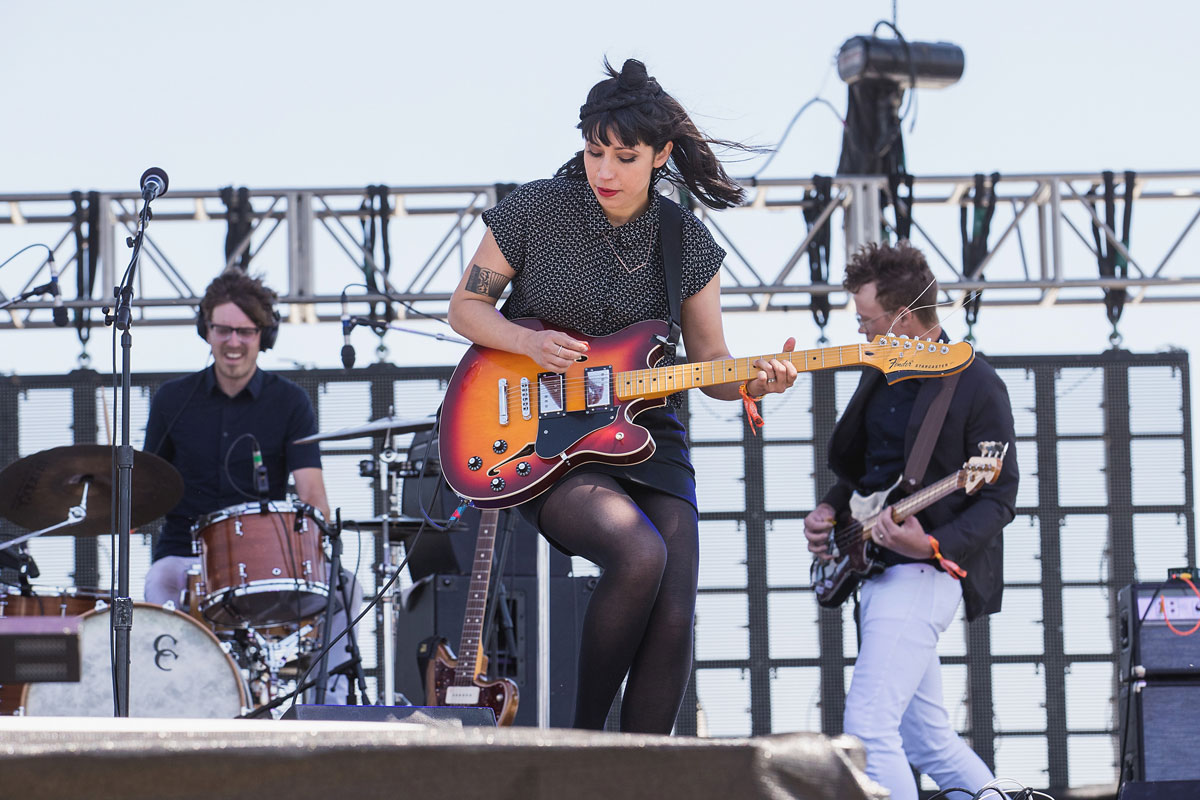Deep Sea Diver: "I wanted the guitar to be more natural on this record, because what I was saying was truer and lyrically stated”
Jessica Dobson talks the guitars and themes behind the band's bold new album, Impossible Weight

Jessica Dobson is at home in Seattle when we talk, but thinking about being elsewhere. Her band Deep Sea Diver is preparing to release their third album Impossible Weight, but the guitarist has previously stood on many of the world’s biggest stages, playing supporting roles to a rotating cast of indie rock royalty including Beck, The Shins, Conor Oberst and the Yeah Yeah Yeahs. Like most of us, though, she’d take just about any show right now.
“I live with my partner Peter, who plays drums in the band,” says Dobson. “So we're lucky to have each other through this time and enjoy this crazy time of releasing…
“But I think right now it’s, mentally, been pretty challenging for a lot of bands or artists. There is a big gaping hole in the performance element right now and I haven't seen anything that fills it.”
While the record itself was made pre-pandemic, it was born out of a period of significant struggle for Dobson and is something of a mirror for a world currently wrestling with its own issues.
We discussed the personal hurdles Dobson faced in the making of Impossible Weight, how she stopped hiding in the fuzz cloud and the record’s raw approach to six-string sounds.
We’ve really enjoyed the videos you’ve made for this record, particularly Lights Out, which has real-time guitar tab. What made you do that?
"Well, we're crazy! We took on this project and it was like, 'OK, wow…’ Because it wasn't just guitar tab, it was guitar tab in realtime with the solo, and I literally had to export every single frame from a different program into the video editor.
Get The Pick Newsletter
All the latest guitar news, interviews, lessons, reviews, deals and more, direct to your inbox!
“We're so limited right now with what we can do video-wise with what's going on in the world, with the pandemic. I wanted to do a lyric video but take it to the next level. I didn't think anyone had done a realtime guitar tab video.
“This was Peter [Jessica’s husband and Deep Sea Diver's drummer] and I talking late into night. I thought, 'Well, no one else can tab this like I can...' So we learned how to video edit. It was really fun and something to do.”
I ended up hitting a wall, emotionally and musically and I needed to take some time away and ask myself some big questions
When was Impossible Weight, as a collection, written?
“The record as a whole originally didn't include the song Impossible Weight and was recorded from the fall of 2018 to January 2019. Then we came out of the studio and we were asking, 'Is this record finished?' I think every band always asks that question and it's a very dangerous question to ask! Because it can really stunt the process and lead you to record a bunch of fluff.
“But we ended up co-writing [with Jennifer Decilveo] and the song Impossible Weight came out. It was crazy, because obviously it dictated the name of the record. It had always been in me subconsciously.
“I knew it was a heavier record, personally, and I needed vocabulary for what I wanted to call it. The song was like a gift, in that respect, it was the last one and it was what I wanted to call it. I just needed to think it and then it was ready."

How would you describe your headspace going into the record?
"I was not in a very good place when we started, coming off the heels of our second record. We finished super-strong, ended the tour after a successful date with Wilco at their festival Solid Sound and I just wanted to get back in the studio and start writing right away. But that's just not how it went.
“I ended up hitting a wall, emotionally and musically and I needed to take some time away and ask myself some big questions. 'What do I want from my life? What do I need to move forward? Do I want to keep playing music in the way I have been? What do I need to do to be a good band member and leader?'
“It's hard to slow down and ask those questions. I think that's why a lot of bands break up. They don't like to ask those questions, because they're scary and the older you get, the scarier they get. It felt like there was a lot on the line."
You don't always know when you're burned-out. It's not until you're in front of something and it just won't start that you realize. How did you tackle that? What helped you?
“Well around that time I started volunteering at a place called the Aurora Commons, which is a non-profit organization for our unhoused neighbors, those who are drug dependent, women who work on the street.
“My friend was the cofounder, so I was hanging out with my neighbors who live on the streets around my house and it was a very life-changing experience for me.
“I started to see how easily I could have been in their place just through life circumstance. They'd often had a horrible childhood, or they'd been sexually abused. You realize it could have happened to anybody.
“It really affected my life and helped me figure things out when I was going through my own anxiety and depression. When you have a motive and a goal to be there for somebody else, it helps you to ignore those voices.”

Reportedly, thoughts about your adoption and meeting your birth mother also had an influence on the record. When did that meeting occur?
“That would have been in 2017. I was so mystified for so many years. I had a great family, growing up. I was adopted by two wonderful people, I had a wonderful sister, but I always had those questions about adoption. I would search online and try to find some information, but the story is crazy.
“Ultimately, I found her on Facebook, which was just... wild. She lived her whole life wondering about me and if I was OK and what I thought about her for giving me up. I see, especially at the Commons, people giving kids up for adoption or having them taken away due to drug dependencies and it's a harrowing experience.
“So it was really wonderful for her to know that I completely respected the decision that she made. That was pretty sweet.”
Any guitar solo on the record is me 100 percent getting out the depression and anxiety
When did you first start to process all this and get some sense of what the record would be?
“I think that in the same way that I was compelled to start working at the Commons, without realizing it, songs just sort of started coming out in 2017. There was a freedom then because I really wasn't planning on writing at the time. I think maybe, lyrically, things shifted, too.
“In the past I would never put things simply, even if it rang true, but on this record there are a lot of mantras. Things I had to sing almost because I didn't believe them at the time. Like on Eyes Are Red where I say, 'Don't be afraid / Don't be ashamed'. I just needed to hear that, so I just sang that.
“On Switchblade, a song directly influenced by the Commons, the chorus is 'It's harder than you think'. So I started picking things that were true to me, even though I cringed. I started to commit to things that I wasn't OK with before. It's what needed to come out on this record.”
Did you think about what that bolder approach would mean for your guitar parts?
“I did. In everything we did – and this is with the help of my co-producer Andy Park as well – we wanted to sharpen the tip of everything. We really focused on that in the production and arrangement.
“On the last record, Secrets, there's a lot more of this brooding, darker, guitar feedback and fuzziness to a lot of the parts and I picture it more as a cloud. This one is more like an arrow, where the melodies are an extension of my lyrics and vocal line.
“That's how I pictured it with a song like Lights Out, with the hooks, it's like a call and response. Any guitar solo on the record is me 100 percent getting out the depression and anxiety and all the things that I had felt bubbling to the surface. I wanted them to come out and be exposed in the guitar solos. That felt really emotional.
“I shaped the tone more on this record, as well. We still had access to so many pedals and colors to choose from but I was really selective and a lot of the guitar work was done direct.
“One of my favorite amp companies, Benson, has a little 5-watt head [Monarch], from which you can go straight out from the head to outboard gear. So it was often like a really fuzzy, little 5-watt amp, direct and then it was sent out and re-recorded in the big room.
“It meant you could have this really direct guitar solo, but also feel the spaciousness of the room. Those things are really important for me.”
For this record, I wanted it to be more natural. I think maybe it was just because what I was saying was truer and lyrically stated. I didn't feel the need for those fuzzy effects
What guitars were you using on the record? I see you’re using a Fender Starcaster in the videos. Was that the case in the studio?
“Yeah, I used the Starcaster for Eyes Are Red. I used an old Silvertone Jupiter for Impossible Weight, paired with my Elvis Costello Jazzmaster. For the cleaner, more sparkly songs I have a '64 pre-CBS Jaguar, Olympic White, and it's beautiful. That was my first vintage guitar. That was pretty much it.
“I keep trying to use guitars with P-90s but it never works out, but I try to cover my bases with some semi-hollows and humbuckers. The Starcaster is just a rad sound, with the Wide Range humbuckers and that paired with the Jazzmaster is just so wildly different.
"I usually use the Jazzmaster for the more punchy parts. I tended to gravitate more on this record towards the sound of a guitar as it overdrives, thinking about the pairings of the guitar and the amp, rather than the last record, which just all about the Klon Centaur and fuzz effects.
“For this record, I wanted it to be more natural. I think maybe it was just because what I was saying was truer and lyrically stated. I didn't feel the need for those fuzzy effects. So it's all about the different feel.
“The Jazzmaster is more inherently clean, but the Starcaster has a different feel because right when you're hitting those strings you get that compressed, overdriven, wide sound without even having to try.
“With the Silvertone, you lay into hard and it does this weird, slightly de-tuned thing, like a tape machine going in and out. Everything has its color and its character and I try to just pick the things I feel in the moment. I want some more guitars, though. I want to get into the Les Paul Junior world. I've never been a Gibson person, but I think that's going to change soon.”

What stands out for you on this record, when you think about the guitars?
“I think definitely Eyes Are Red, the three-minute solo at the end. As a whole, as a band, I feel we're shining in that moment. We tried to take that arrangement out of the ordinary space and have this kind of hypnotic, LCD Soundsystem thing where the groove never changes and you're just locked-in.
“I didn't allow myself too many takes and I think you can really hear the spirit in that guitar solo. I don't think there were many effects on it, probably my Electro-Harmonix Memory Man and the [Sarno Music Solutions] Earth Drive, which is one of the ones that Nels Cline recommend to me when I kept seeing him on tour when The Shins were on the same circuit as Wilco.
“So I think I used that. I tried to get in that spirit of that Fleetwood Mac song The Chain, where he just stays on the note and the backbeat just feels circular and locked-in. Every time I hear it, it feels so good to me. So that's my favorite part.”
How will you know whether this record works or not? What are the markers for you?
“Great question. It's one we've been asking ourselves. I don't know what success looks like because it's different for everybody. So far, more people know about our band, but we have been true to ourselves in that we have been scrappy, we have been true and we have worked our asses off.
“I don't know what success looks like in a time when you can't tour, but the pre-orders we've packaged in our basement have been twelvefold more. It's insanity and amazing that our fans are there for us.”
- Deep Sea Diver's new album Impossible Weight is out now via ATO/High Beam.

Matt is Deputy Editor for GuitarWorld.com. Before that he spent 10 years as a freelance music journalist, interviewing artists for the likes of Total Guitar, Guitarist, Guitar World, MusicRadar, NME.com, DJ Mag and Electronic Sound. In 2020, he launched CreativeMoney.co.uk, which aims to share the ideas that make creative lifestyles more sustainable. He plays guitar, but should not be allowed near your delay pedals.
“We hadn’t really rehearsed. As we were walking to the stage, he said, ‘Hang on, boys!’ And he went in the corner and vomited”: Assembled on 24 hours' notice, this John Lennon-led, motley crew supergroup marked the beginning of the end of the Beatles
“I pushed myself to down-pick faster and make the riffs more aggressive. Maybe it’s the old man in me struggling to feel young and fighting back against aging”: How Killswitch Engage went to thrash metal bootcamp to deliver their face-ripping return









